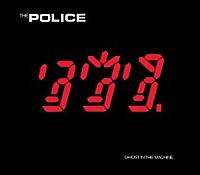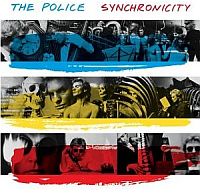The Police
Virtual rulers of all they surveyed way back in the late 1970s and early 1980s, the Holy Trinity of Sting, Stewart Copeland and Andy Summers belatedly adopted the punk aesthetic of the times, and remoulded it into something slicker and sharper. The Police made no bones about how technically proficient they were, which was certainly a stark contrast to the devil-may-care, fuck-all sensibilities of more nihilistic punk gangs like The Clash or The Sex Pistols.
Each member brought an invaluable talent to the table, making for a tightly wound unit. Copeland was simply a great drummer, with his accomplished percussion work, alternating between impossibly complex polyrhythms and dependably solid, straightforward cadences. Guitarist extraordinaire Summers had a defined axe-wielding style that he used to create sonically interesting tones. And let's not forget about Sting, whose sinuous bass playing, charged, upfront vocals and pop-songwriting smarts made him the virtual centre of the band, notwithstanding the accusations of dictatorship hurled his way at the fag end of the group’s existence.
With such a splendid array of skills on display and such enduring rock classics in the band’s repertoire, it's worthwhile to take a brief gander at each of the five studio albums The Police produced in their seven-year tenure in the business:

OUTLANDOS D'AMOUR (1978)
The Police's debut record remains their most direct and immediate work, far removed from the oftentimes-dense production values of the later years. The immortal "Roxanne" is the best-known number from here, although follow-up singles "Can't Stand Losing You" and "So Lonely" also constituted fan favourites. Elsewhere, "Next to You" and "Truth Hits Everybody" prove that the band could rock as hard as any given punk act, while the salacious inflatable-doll ditty "Be My Girl/Sally" is bemusing proof of their sense of humour.

REGGATTA DE BLANC (1979)
"Message in a Bottle" is the big single from here, the group's sophomore effort, which saw a more focused sensibility all around, with any remaining rough edges neatly pared out. "Walking on the Moon" featured one of the most memorable bass lines in rock history, while "Bring On the Night" brought out the band's hitherto hidden jazz proclivities. The familiar Police humour was in evidence again on "Does Everyone Stare" and "On Any Other Day". The closing "No Time This Time" is arguably Copeland's most realised moment, as proven in its fierce, concentrated percussive attack and effortlessly shifting time signature.

ZENYATTA MONDATTA (1980)
The band hit the big time with this third endeavour, which went Top Ten everywhere, staying at number one for an impressive four weeks. The global hit "Don't Stand So Close to Me" is only slightly marred by the atrocious rhyming of the phrase "Shake and cough" with "Nabokov", while "Driven to Tears" was the first Police song to put on display Sting's emerging political ideals (which would fully blossom in his solo career). Often overlooked on this album are the two masterful instrumentals by Summers and Copeland, "Behind My Camel" and "The Other Way of Stopping".

GHOST IN THE MACHINE (1981)
A mostly dour, sombre affair that is redeemed somewhat by the joyous, uncomplicated "Every Little Thing She Does Is Magic" (which saw the first use of a synthesiser on a Police song). However, it gets rather heavy going elsewhere, i.e. in the deceptively jaunty "Spirits in the Material World" (a heavy-handed Sting commentary on the state of the world), the morose "Invisible Sun" (a preachy treatise on the Irish Troubles), and the dark, Dystopian anecdote "Omega Man". The bleak, mean-spirited "Darkness" makes for the most disconsolate ending track on any Police album, ever.

SYNCHRONICITY (1983)
The final musical chapter in The Police's story is also a blockbuster critical and commercial success, spending an incredible 17 weeks perched atop the US charts. The deathless stalker anthem "Every Breath You Take" might have become Sting's ever-trustworthy, perennial cash cow, but believe it or not, there are other, stronger moments on the album. The quietly threatening "Wrapped Around Your Finger" is a brilliant verse study in power-play innuendoes, while the despairing "King of Pain" is striking in its use of lyrical metaphors. Elsewhere, the two "Synchronicity" tracks are commanding, highly assured, and arguably the only rock songs so far to make extensive references to Jungian parallelism theory. The concluding "Tea in the Sahara" is absolutely jaw-dropping, an astonishing, sophisticated demonstration in the proper usage of instrumental space in a rock song.
Each member brought an invaluable talent to the table, making for a tightly wound unit. Copeland was simply a great drummer, with his accomplished percussion work, alternating between impossibly complex polyrhythms and dependably solid, straightforward cadences. Guitarist extraordinaire Summers had a defined axe-wielding style that he used to create sonically interesting tones. And let's not forget about Sting, whose sinuous bass playing, charged, upfront vocals and pop-songwriting smarts made him the virtual centre of the band, notwithstanding the accusations of dictatorship hurled his way at the fag end of the group’s existence.
With such a splendid array of skills on display and such enduring rock classics in the band’s repertoire, it's worthwhile to take a brief gander at each of the five studio albums The Police produced in their seven-year tenure in the business:

OUTLANDOS D'AMOUR (1978)
The Police's debut record remains their most direct and immediate work, far removed from the oftentimes-dense production values of the later years. The immortal "Roxanne" is the best-known number from here, although follow-up singles "Can't Stand Losing You" and "So Lonely" also constituted fan favourites. Elsewhere, "Next to You" and "Truth Hits Everybody" prove that the band could rock as hard as any given punk act, while the salacious inflatable-doll ditty "Be My Girl/Sally" is bemusing proof of their sense of humour.

REGGATTA DE BLANC (1979)
"Message in a Bottle" is the big single from here, the group's sophomore effort, which saw a more focused sensibility all around, with any remaining rough edges neatly pared out. "Walking on the Moon" featured one of the most memorable bass lines in rock history, while "Bring On the Night" brought out the band's hitherto hidden jazz proclivities. The familiar Police humour was in evidence again on "Does Everyone Stare" and "On Any Other Day". The closing "No Time This Time" is arguably Copeland's most realised moment, as proven in its fierce, concentrated percussive attack and effortlessly shifting time signature.

ZENYATTA MONDATTA (1980)
The band hit the big time with this third endeavour, which went Top Ten everywhere, staying at number one for an impressive four weeks. The global hit "Don't Stand So Close to Me" is only slightly marred by the atrocious rhyming of the phrase "Shake and cough" with "Nabokov", while "Driven to Tears" was the first Police song to put on display Sting's emerging political ideals (which would fully blossom in his solo career). Often overlooked on this album are the two masterful instrumentals by Summers and Copeland, "Behind My Camel" and "The Other Way of Stopping".

GHOST IN THE MACHINE (1981)
A mostly dour, sombre affair that is redeemed somewhat by the joyous, uncomplicated "Every Little Thing She Does Is Magic" (which saw the first use of a synthesiser on a Police song). However, it gets rather heavy going elsewhere, i.e. in the deceptively jaunty "Spirits in the Material World" (a heavy-handed Sting commentary on the state of the world), the morose "Invisible Sun" (a preachy treatise on the Irish Troubles), and the dark, Dystopian anecdote "Omega Man". The bleak, mean-spirited "Darkness" makes for the most disconsolate ending track on any Police album, ever.

SYNCHRONICITY (1983)
The final musical chapter in The Police's story is also a blockbuster critical and commercial success, spending an incredible 17 weeks perched atop the US charts. The deathless stalker anthem "Every Breath You Take" might have become Sting's ever-trustworthy, perennial cash cow, but believe it or not, there are other, stronger moments on the album. The quietly threatening "Wrapped Around Your Finger" is a brilliant verse study in power-play innuendoes, while the despairing "King of Pain" is striking in its use of lyrical metaphors. Elsewhere, the two "Synchronicity" tracks are commanding, highly assured, and arguably the only rock songs so far to make extensive references to Jungian parallelism theory. The concluding "Tea in the Sahara" is absolutely jaw-dropping, an astonishing, sophisticated demonstration in the proper usage of instrumental space in a rock song.

1 Comments:
Excellent reviews -- well-written and right on, in my opinion. My only complaint... yes, Ghost in the Machine has some dark tunes, but that in no way changes the fact that it is both brilliant and under-rated ("Secret Journey" in particular). "Hungry for You" reminds me of their first album, and "Rehumanize Yourself" is an example of what the Police did so well: package commentary and lyrical agility in infectious and virtuosic musical performance.
Post a Comment
<< Home